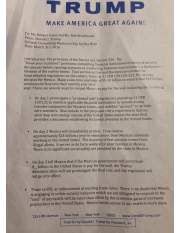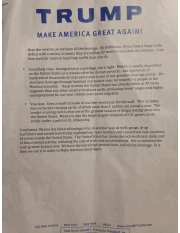The State Criminal Alien Assistance Program (SCAAP) reimburses state and local governments for the costs of incarcerating unauthorized immigrants. Originally authorized by the Immigration Reform and Control Act of 1986, the program was not funded until the Violent Crime Control and Law Enforcement Act of 1994 (P.L. 103-322.) Funding has never fully covered state costs. More here.
****
To read the Inspector General Report on compliance and conditions per city, click here, if you dare.
We are out of our minds…..we can never measure all the costs of illegals, foreign criminals and the ongoing future costs.
State Criminal Alien Assistance Program (SCAAP)
Notice to SCAAP Applicants:
Applicants for SCAAP funds are required to certify compliance with all applicable Federal laws at the time of application. In that regard, Members of Congress have asked the Department of Justice to examine whether jurisdictions with “sanctuary policies” (i.e., policies that either prevent law enforcement from… read more
Notice to SCAAP Applicants:
Applicants for SCAAP funds are required to certify compliance with all applicable Federal laws at the time of application. In that regard, Members of Congress have asked the Department of Justice to examine whether jurisdictions with “sanctuary policies” (i.e., policies that either prevent law enforcement from releasing persons without lawful immigration status into Federal custody for deportation, or that prevent state or local law enforcement from sharing certain information with Department of Homeland Security (DHS) officials) are in violation of 8 U.S.C section 1373. For that reason, all applicants should understand that if OJP receives information that indicates that an applicant may be in violation of 8 U.S.C. section 1373 (or any other applicable federal law) that applicant may be referred to the DOJ Office of Inspector General for investigation; if the applicant is found to be in violation of an applicable federal law by the OIG, the applicant may be subject to criminal and civil penalties, in addition to relevant OJP programmatic penalties, including cancellation of payments, return of funds, participation in the program during the period of ineligibility, or suspension and debarment.
Fiscal Year 2016 SCAAP Application
NEW: The Fiscal Year 2016 SCAAP application period has closed. SCAAP participants will be notified of the 2016 award amounts by the end of October 2016.
2016 SCAAP Data:
FY 2016 SCAAP Guidelines (PDF)
FY 2016 ICE Country Codes (PDF)
FY 2016 Inmate Data File Format (PDF)
FY 2015 SCAAP Awards
Please see the 2015 awards amounts here.
Update on the Payments for “Unknown” Alien Status Inmate Days
The Department of Justice (DOJ) will continue the reimbursements for the unknown category of SCAAP inmates for the FY 2015 SCAAP awards. SCAAP grantees are strongly encouraged to work collaboratively with DHS in the following programs in order to increase their inmate alien status verifications. Those programs include:
- 287(g) Program: The 287(g) program allows a state and local law enforcement entity to enter into a partnership with ICE in order to receive delegated authority for immigration enforcement within their jurisdictions. This allows the officials in the jurisdictions to match inmate records prior to the SCAAP application process. For more information, see the following web site: www.ice.gov/news/library/factsheets/287g.htm.
- The Law Enforcement Support Center (LESC): LESC is a single national point of contact that provides timely customs information and immigration status and identity information and real-time assistance to local, state and federal law enforcement agencies on aliens suspected, arrested or convicted of criminal activity. For more information, see the following web site: www.ice.gov/LESC/ or call 802-872-6000
.
- Priority Enforcement Program (PEP): PEP begins at the state and local level when an individual is arrested and booked by a law enforcement officer for a criminal violation and his or her fingerprints are submitted to the FBI for criminal history and warrant checks. This same biometric data is also sent to U.S. Immigration and Customs Enforcement (ICE) so that ICE can determine whether the individual is a priority for removal, consistent with the DHS enforcement priorities described in Secretary Johnson’s November 20, 2014 Secure Communities memorandum. Under PEP, ICE will seek the transfer of a removable individual when that individual has been convicted of an offense listed under the DHS civil immigration enforcement priorities, has intentionally participated in an organized criminal gang to further the illegal activity of the gang, or poses a danger to national security. http://www.ice.gov/pep
Overview:
BJA administers the State Criminal Alien Assistance Program (SCAAP) in conjunction with the Bureau of Immigration and Customs Enforcement (ICE) and Citizenship and Immigration Services, Department of Homeland Security (DHS). SCAAP provides federal payments to states and localities that incurred correctional officer salary costs for incarcerating undocumented criminal aliens with at least one felony or two misdemeanor convictions for violations of state or local law, and incarcerated for at least 4 consecutive days during the reporting period.
Use of SCAAP Awards
The Department of Justice Reauthorization Act of 2005 (Pub. L. 109-162, Title XI) included the following requirement regarding the use of SCAAP funds: “Amounts appropriated pursuant to the authorization of appropriations in paragraph (5) that are distributed to a State or political subdivision of a State, including a municipality, may be used only for correctional purposes.” Beginning with FY 2007 SCAAP awards, SCAAP funds must be used for correctional purposes only.
FY 2007-2012 SCAAP Use of Funds List
- Salaries for corrections officers
- Overtime costs
- Corrections work force recruitment and retention
- Construction of corrections facilities
- Training/education for offenders
- Training for corrections officers related to offender population management
- Consultants involved with offender population
- Medical and mental health services
- Vehicle rental/purchase for transport of offenders
- Prison industries
- Pre-release/reentry programs
- Technology involving offender management/inter-agency information sharing
- Disaster preparedness continuity of operations for corrections facility
Legislation
SCAAP is governed by Section 241(i) of the Immigration and Nationality Act, 8 U.S.C. 1231(i), as amended, and Title II, Subtitle C, Section 20301, Violent Crime Control and Law Enforcement Act of 1994, Public Law 103-322.



